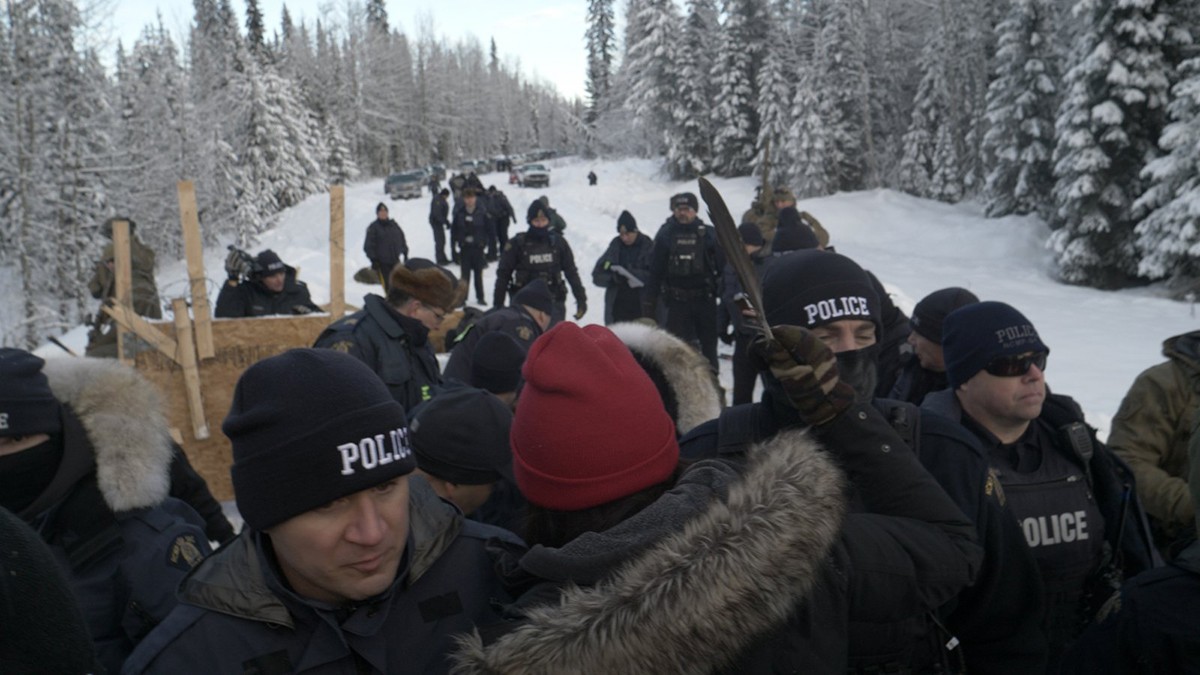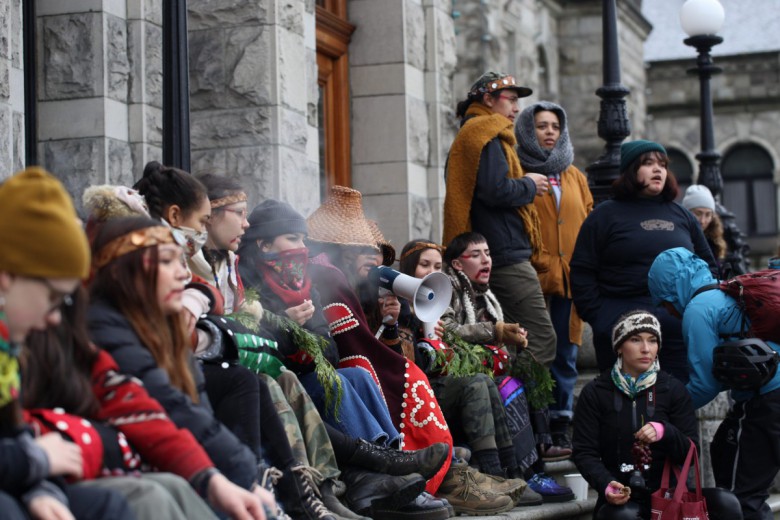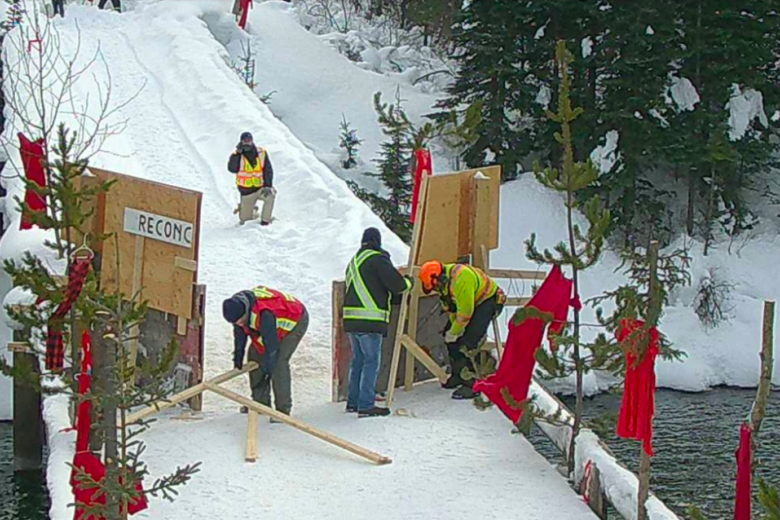Last week in so-called Western Canada, the actions of police showed that their priority is to protect the oil and gas industry and maintain the settler colonial state. Whether it is the RCMP invading Wet'suwet'en territory or the Regina Police Service arresting locked-out Unifor workers fighting for their pensions, police are preventing us from being able to secure a livable climate future.
As you should know, the predecessor to the Royal Canadian Mounted Police, the North-West Mounted Police, was formed in 1873 to protect ‘law and order,’ and forcibly displace Indigenous people as settlers advanced west following Canada’s supposed acquisition of Rupert’s Land, which was previously ‘owned’ by the Hudson’s Bay Company.
Just like the fur trade during its height in the 18th and 19th centuries, the oil and gas industry today operates on the logic that it has jurisdiction over Indigenous land, and that a few men should be massively wealthy from the exploitation of many.
Unions must realize that police are arresting workers and land defenders for the same reason – to keep the oil flowing to help big corporations make a profit.
In service of that industry, since Thursday the RCMP have been invading Wet'suwet'en territory and arresting land defenders. They are enforcing a court injunction ordering the Morice West Forest Service Road be cleared to allow for construction on the Coastal GasLink pipeline. The $6 billion, 670-kilometre pipeline has received approval from the province, and 20 First Nations band councils have signed impact benefit agreements (which do not equate to consent) – including five of the six band councils of the Wet'suwet'en Nation. But the Hereditary Chiefs – who are the leaders of the Nation's governance system that was in place before the imposition of the Indian Act – have said that no pipelines can be built in their 22,000 square kilometre territory without their consent.
They assert this in part because the Wet'suwet'en have never entered a Treaty agreement with the Crown to allow settlers to live or develop their own economies on that territory. The 1997 Delgamuukw Supreme Court decision affirmed that Wet’suwet’en lands are unceded, meaning the Wet’suwet’en retain underlying title to their land. To be clear, I am not insinuating that numbered Treaty lands have been ceded – rather that settler colonial courts have themselves verified that the Wet'suwet'en have retained title, and that Canada refuses to abide by the decisions of its own legal system.
The invasion comes barely two months after British Columbia became the first province to enshrine the United Nations Declaration on the Rights of Indigenous Peoples (UNDRIP) into law. Article 10 of UNDRIP notes that “Indigenous peoples shall not be forcibly removed from their lands or territories.” In December, it was revealed that in last year’s raid of the Gidimt’en checkpoint, the RCMP were prepared to shoot Indigenous land defenders, with notes from a strategy session saying that “lethal overwatch is req’d.”
On the same morning of the raid on the first Wet’suwet’en checkpoint, in Treaty 4, Regina police arrested four people on the Unifor picket line at the Co-op Refinery Complex, one of Canada’s largest oil refineries. Unifor’s lead negotiator was arrested and charged with mischief. Unifor members have been barricading the refinery since January 20, 2020 and it has been two months since members of Unifor local 594 were locked out by Federated Co-operatives Limited (FCL). This labour dispute centers on access to a fair pension, with FCL attempting to eliminate an existing 100 per cent employer-funded defined benefit pension plan.
“This was clearly coordinated between the Co-op and the police, which shows that police are just an arm of the corporation,” said Unifor national president Jerry Dias in a statement on Friday.
Meanwhile, the raid on Wet’suwet’en happened soon after talks between the Province of B.C. and the Hereditary Chiefs broke down. The meetings, which were supposed to last seven days, were called off after two days by Coastal GasLink, when Hereditary Chiefs refused to allow pipeline workers back into their territory. “We always knew that industry was directing government,” Hereditary Chief Na’Moks told Vice News, “but this is the first time we’ve ever seen them say it publicly, right there in our meeting minutes.”
In a recent study of almost 100 injunction cases, the Yellowhead Institute found that 76 per cent of injunctions filed against First Nations by corporations were granted by Canadian courts, while 81 per cent of injunctions filed by First Nations against corporations were denied.
“This was clearly coordinated between the Co-op and the police, which shows that police are just an arm of the corporation.”
The Wet'suwet'en (including all those blockading on their behalf) and the Unifor workers are both interrupting the flow of capital within Canada in order to advocate for their collective livelihoods, and it’s for that reason that Canada is using police violence against them. Even so, it’s not a clean parallel to draw: Indigenous livelihoods are threatened by oil and gas projects – and the Co-op Refinery is part of that system. One of the major reasons for Indigenous opposition to pipeline projects is the accompanying influx of oil and gas workers in the form of man camps, which increase violence towards Indigenous women in surrounding communities. If the Wet’suwet’en won, it would mean less oil extraction; if the Co-op Refinery workers won, it would likely mean more (at least temporarily).
For decades, segments of the labour movement – and specifically unions that represented fossil fuel workers, like the Oil, Chemical and Atomic Workers Union (OCAW) – have looked toward a transition to clean energy. These unions understood that jobs based on non-renewable resources could not be sustained, so they advocated for fully-funded job transition programs to bridge workers to renewable energy jobs. In the late 1970s Unifor’s predecessor, OCAW, developed its own National Energy Policy. This policy sought to put ownership of the oil industry in public hands, and advocated for massive investment in solar, wind, and biomass energy research and development.
What if unions began leveraging their multi-million-dollar budgets, massive memberships, paid organizers, and political power to support Indigenous land defense and repatriation? Unions must realize that police are arresting workers and land defenders for the same reason – to keep the oil flowing to help big corporations make a profit, at the expense of the working class livelihoods and Indigenous sovereignty.
The logical response would be for unions like Unifor to begin taking direct action in solidarity with Indigenous land defenders – blocking rail lines and ports, and occupying ministers’ offices, as many Indigenous youth and allies have done over the last month. This would also mean Unifor local 594 learning more about how they can support the full implementation of Treaty 4, given that is where the workers of the Co-op Refinery live and work. For now, Unifor should issue a public statement in support of the Wet’suwet’en, calling for the RCMP to stand down.







